Today’s issue of Dziennik Gazeta Prawna features an article on financial corrections made by Polish institutions in charge of spending EU funds. Jan Roliński, board member of the Public Procurement Law Association, points to an increased frequency of corrections as well as officiousness and formalism of auditors.
On 27 June 2018, the Management Board of the Public Procurement Law Association presented the Ministry of Entrepreneurship and Technologies and the Public Procurement Office with its position paper on the selected solutions proposed in the “Outline of the new Public Procurement Law”. The opinion paper is available here.
Comments and suggestions submitted by the Association on 6 June 2018 with regard to means of legal protection, including compensation for entities that sustained damage as a result of a breach of public procurement law, form an integral part of the position paper. The Association’s 6 June 2018 position paper is available here.
The June edition of the “ZAMÓWIENIA PUBLICZNE DORADCA” magazine features an article about the Bill on Public Life Transparency which, if adopted in the proposed wording, will have a substantial impact on the public procurement sector. This publication was prepared on the basis of an opinion paper drafted by the Public Procurement Law Association and presented to the Permanent Committee of the Polish Cabinet. The article was penned by Jan Roliński, member of the Association board.
Full text is available here:
Presentations delivered at the “Competition Law and Public Procurement — Two Sides of the Same Coin” conference held on 12 June 2018 may be downloaded here:
On 18 June 2018, Aldona Kowalczyk and Mirella Lechna in a commentary for Dziennik Gazeta Prawna evaluated the outline of the new Public Procurement Law drafted by the Ministry of Entrepreneurship and Technologies and the Public Procurement Office. The assumptions made in the proposed regulations, including proposals of changes in the legal remedies available to bidders, are consistent with proposed reforms put forward by our experts.
13 June 2018 the Polish daily Dziennik Gazeta Prawna published an article on the international conference titled “Competition Law and Public Procurement — Two Sides of the Same Coin” organized by the Public Procurement Law Association. The article quoted Dr. Wojciech Hartung, Dr. Albert Sánchez Graells and Dr. Igor Nestoruk, who discussed the problems connected with public procurement law tackled at the international event.
The full article is available here:
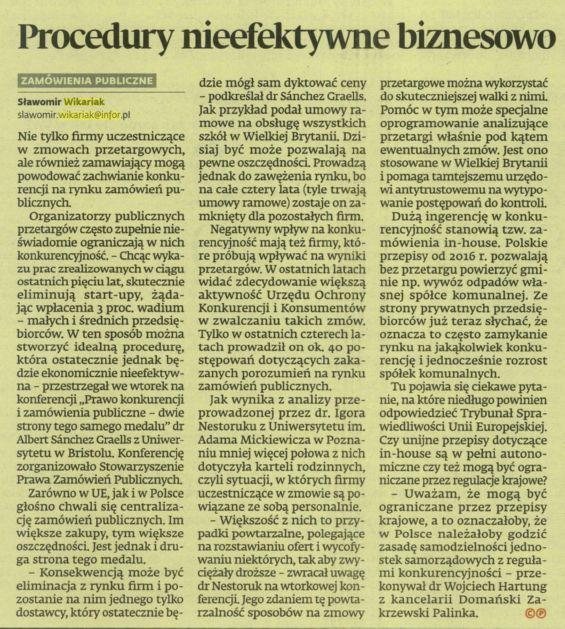
As mutual relations between competition law and public procurement law become clearer, the two areas cannot be treated separately. Consequently, it is necessary to assess participants of the public procurement market (both contractors and contracting authorities) also from the perspective of the broadly understood competition rules - these are one of the most important proposals that have been formulated in the course of the conference "Competition Law and Public procurement - two sides of the same coin", which took place on 12 June in Warsaw. The conference organized by the Public Procurement Law Association was attended by scientists, experts and practitioners of the public procurement and competition law, both from Poland and abroad (including from Lithuania, Germany and the UK).
The conference “Competition Law and Public Procurement - two sides of the same coin” was held on Tuesday, 12 June. The event was dedicated to distortions of competition in public tenders from the perspective of competition law and public procurement law.
The organizer - the Public Procurement Law Association - invited experts and practitioners from Poland and abroad who work in the field of public procurement law and competition law.
Guests had the opportunity to attend lectures on the distortion of competition due to the behaviour of contracting authorities and contractors, events of abuse of dominant positions on the public procurement market and recent case law of the Court of Justice of the European Union on the ‘self-cleaning’ institution. The panel’s participants discussed, among others, how to handle competition breaching behaviour in the course of tender proceedings and how contracting authorities should counteract the abuse of contractual advantage .
Contributions were delivered by Dr Albert Sánchez Graells of Bristol University, Dr Igor B. Nestoruk of Adam Mickiewicz University in Poznań, Ms. Irma Urmonaitė, a representative of the Lithuanian Competition Office, Dr Anna Blume Huttenlauch of the German law firm Blomstein and Dr Wojciech Hartung a representative of the Association. Panel discussions were also attended by representatives of state institutions, including among others, Ms. Małgorzata Stręciwilk, President of the Public Procurement Office, Ms. Małgorzata Rakowska, President of the National Appeal Chamber, Ms. Magdalena Grabarczyk, Vice-president of the National Appeals Chamber, Professor Marta Romańska, a judge of the Supreme Court, as well as representatives of the Office for Competition and Consumer Protection and representatives of the contracting authorities and contractors.
Selected power point presentations are available for download here:
The Ministry of Entrepreneurship and Technologies in collaboration with the Public Procurement Office developed an outline of the new Public Procurement Law and published it on 6 June 2018. According to the authors, the new statutory act is aimed at improving the quality of public procurement laws.
This has also been the overriding objective of our Association. Since our inception, we have taken up and pursued a number of initiatives to diagnose the condition and quality of public procurement laws in Poland and Europe and have put forward proposals addressing the problems we identified.
The Public Procurement Law Association prepared an expert analysis of selected issues connected with legal remedies which need incorporating into the Polish legal system with a view to enhancing the efficiency of the Polish legal remedies system, in line with review procedure directives.
The analysis was submitted on 8 June 2018 to the Ministry of Entrepreneurship and Technologies, the Public Procurement Office, the National Appeals Chamber and the Ministry of Justice.
You can read the Association’s position paper here:
Ekspertyza Stowarzyszenia Prawa Zamówień Publicznych
On 16 May 2018 the Advocate General of the Court of Justice of the European Union delivered his opinion in case C-124/17, Vossloh Laeis, concerning exclusion of an economic operator due to an executed anti-competitive agreement and the measures the contractor took in an attempt to prevent its exclusion. On 12 June 2018 Dr Roland Stein will talk to us about the concerns surrounding the case at the conference “Competition law and public procurement – two sides of the same coin” organized by the Public Procurement Law Association.
The conference will be attended by, among others, Dr Albert Sanchez-Graells and Irma Urmonaite of the Lithuanian Competition Council.
The conference is aimed at representatives of economic operators and contracting authorities. Persons wishing to attend should send an e-mail to: This email address is being protected from spambots. You need JavaScript enabled to view it..
The conference organizers will confirm your place at the event. Attendance is free of charge. The detailed program of the conference will be announced soon.
In an interview with Rzeczpospolita, Jan Roliński, member of the SPZP Board, presented comments and concerns in relation to the Public Life Transparency Act and its potential adverse impact on the Public Procurement Law and the public procurement market.
The full interview is available here.
On May 4, 2018 Anna Szymańska and Wojciech Hartung participated, at the invitation of the European Commission, as representatives of the Public Procurement Law Association, in a meeting of representatives of the appeal bodies of first instance in the EU Member States in Malta. During the meeting they discussed the report "The functioning of legal protection measures in EU countries. Key findings". The report met with great interest among the participants and triggered a lively discussion. The report is available here.
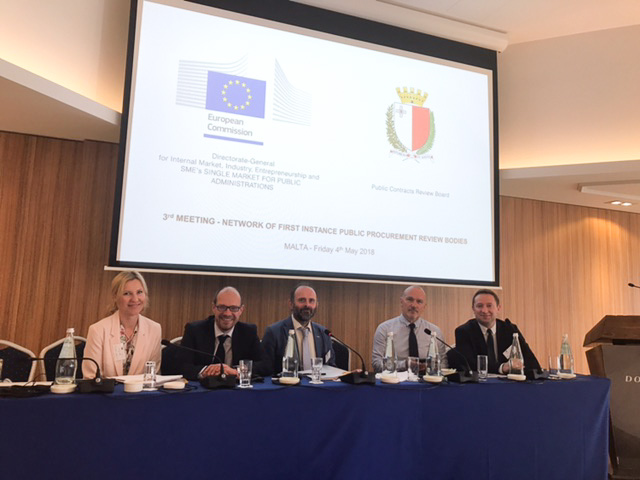
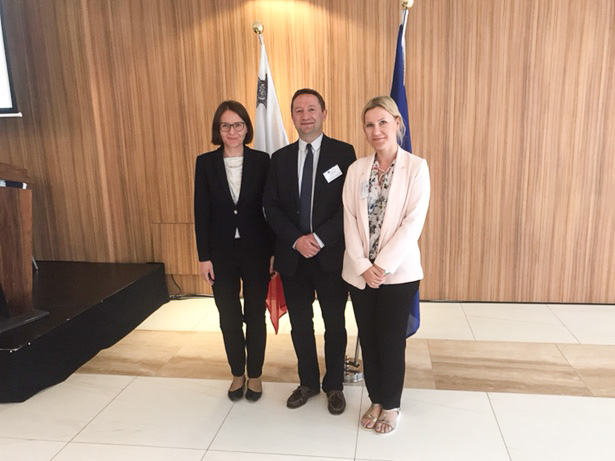
The Public Procurement Law Association has presented the results of a questionnaire concerning measures of legal protection enjoyed by contractors in public procurement proceedings. Most of the contractors represented were small and medium-sized enterprises (SMEs); however responses to the questionnaires were also received from large enterprises. Over half of the respondents indicated that the fee for an appeal to the National Appeals Chamber is appropriate, however, about 40% found it to be too high. As it turns out, this has a direct impact on further actions, as for 40% of respondents the amount of the fee is an obstacle to their filing an appeal. The problem is even more fundamental in the case of appeals against rulings handed down by the National Appeals Chamber filed with the court – for 66% of respondents the amount of the fee prevented them (at least once) from taking advantage of the above remedy. In addition, 66% of contractors also found the fee to be too high. 75% of contractors have not filed a complaint against a ruling of the National Appeals Chamber. As many as 20% of contractors received an advantageous court ruling and yet they were still not awarded the contract. Despite this, none of them have taken any steps in order to obtain compensation from the awarding authority.
The contractors presented very important issues concerning the present appeal system which significantly prevents them from pursuing their rights. The legislator may benefit from the survey’s key conclusions in connection with the pending works on the new public procurement law. The survey shows that for the majority of respondents, including in particular the MSEs, access to the appeal measures is hindered by overly high costs. The question of whether fixed thresholds are really necessary continues to be valid.
In addition, the contractors encountered problems with the application of court rulings by the awarding authorities. The report underlines key problems faced by contractors in the current legal environment and provokes a discussion before the planned legal changes concerning measures of legal protection are enacted.
A file presenting a detailed analysis of the results of the questionnaire is available for download below.
On March 26, 2018, the Board of the Public Procurement Law Association (SPZP) provided the Standing Committee of the Council of Ministers with a letter presenting its remarks and concerns regarding the draft bill on transparency in public life and its potentially adverse impact on the Public Procurement Law and the public procurement market.
The Association believes that some of the provisions contained in the draft bill should not be promulgated in their current wording.
A copy of the letter with the Association’s remarks is available here.
The first Annual Meeting of the Public Procurement Law Association members was held in Warsaw on Tuesday, 20 February 2018, at the offices of Kancelaria Wardyński i Wspólnicy sp. k. The meeting was attended by nearly all members and its agenda included such items as summing up and approving the activities of the Association in 2017, adopting amendments to the Association’s Charter and discussing plans for 2018.
Members of the Association also discussed such issues as: (1) procurements below EU thresholds, (2) certain premises for exclusion of certain contractors from public procurement proceedings, (3) certain issues connected with appeals against KIO awards, as well as (4) the bill on Public Life Transparency.
In the course of the ensuing discussions, working teams were set up to develop the Association’s official stance and legislative suggestions with regard to the above.
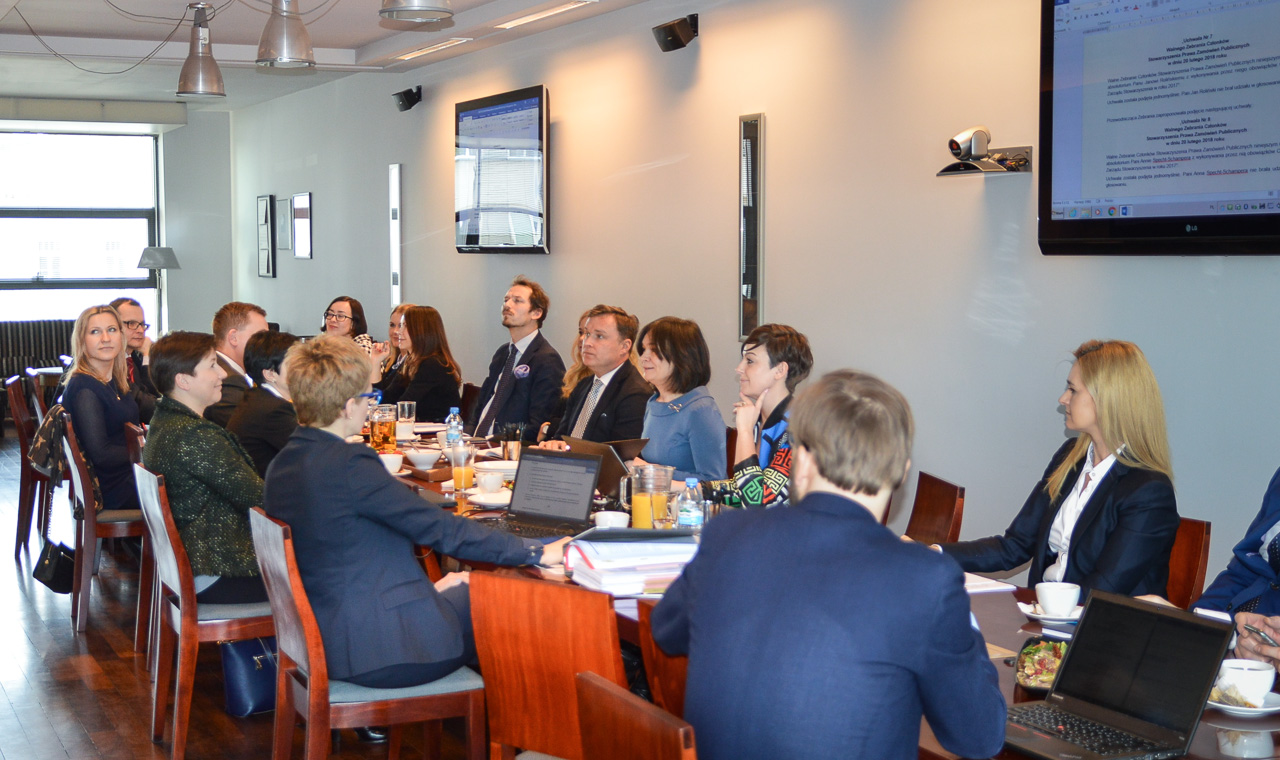
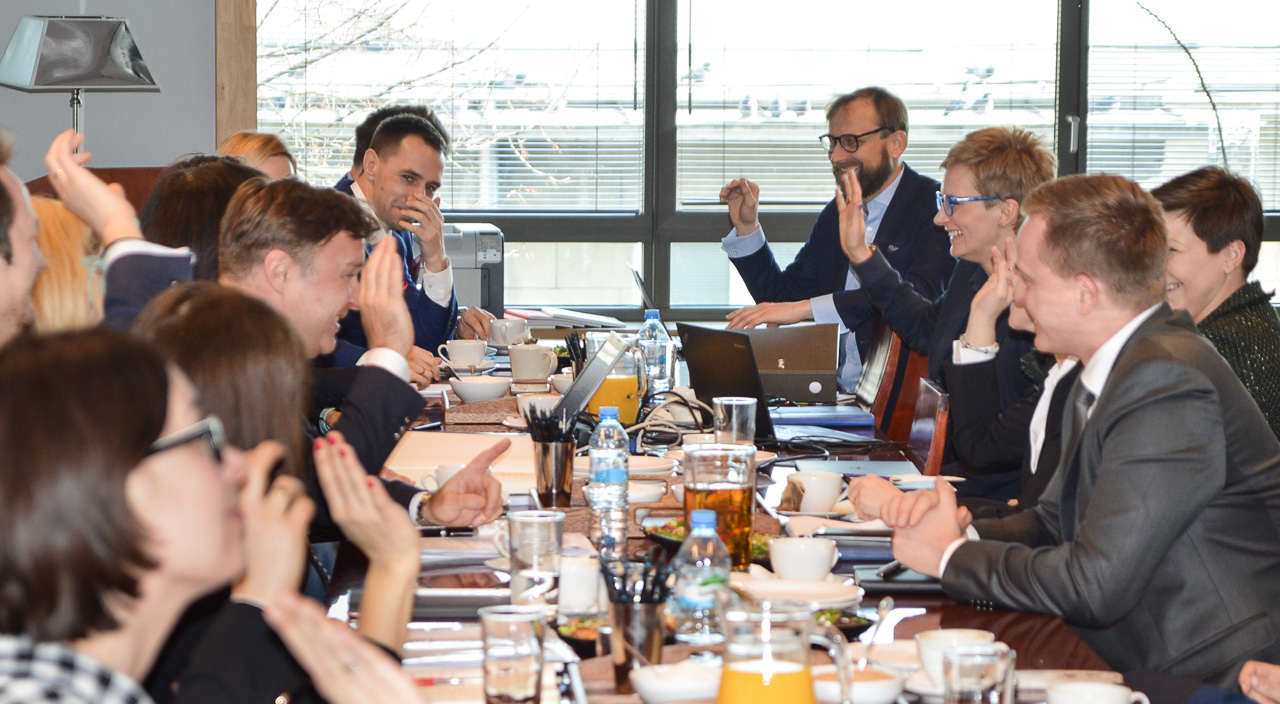
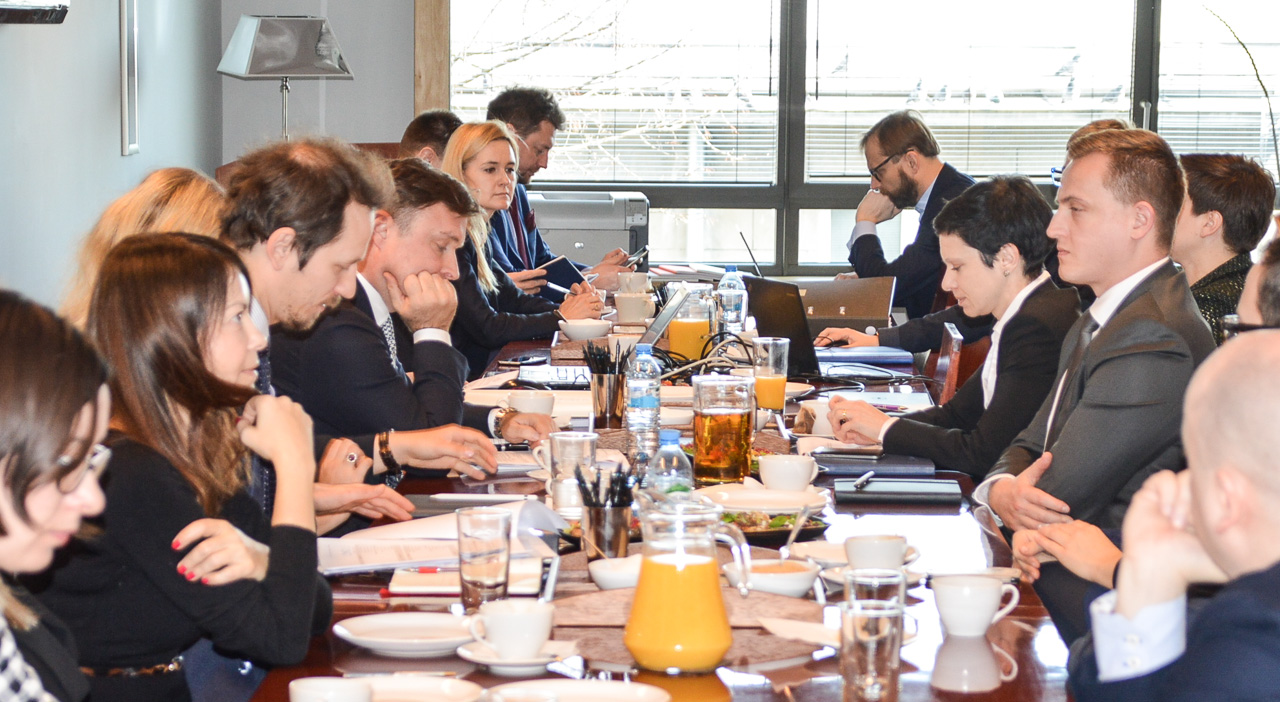
The European Commission thanked the Public Procurement Law Association for preparing and presenting the report “Report on legal protection systems in EU member states”. Mr. Alvydas Stančikas of the Directorate-General for Internal Market, Industry, Entrepreneurship and SME in the European Commission also invited the co-authors of the report: Anna Szymańska, Dr. Piotr Bogdanowicz and Dr. Wojciech Hartung to participate in the next meeting of the working group established by the European Commission, composed of members of appeal bodies of the first instance in EU member states. The meeting will be held on 4 May 2018 in Malta. Representatives of our Association will have an opportunity to present the report and its conclusions.
The January edition of the ‘Monitor Zamówień Publicznych’ gazette features an extensive article discussing the report on the functioning of legal protection measures in EU member states, prepared by members of the Association. We encourage you to read the article here.
We encourage you to take part in our survey (in Polish) on the costs of appealing to the National Appeals Chamber (KIO) and filing complaints against KIO rulings to regional courts in connection with pending procedures for the award of public contracts.
With this survey we hope to see if the currently applicable costs of these remedies are not perhaps excessively prohibitive. We would also like to determine what the market players regard as the most reasonable level of these costs.
The questionnaire and analysis of the responses to it form part of an ongoing project looking into the broader issue of legal protection currently available in the public procurements system. As part of this project, our Association produced a report titled “Functioning of Legal Protection Measures in EU Countries. Key Conclusions” which is available on our website. The report also details conclusions relevant to the situation in Poland.
The review of registration fees charged in appeal procedures before the KIO and when complaints are filed with regional courts against KIO rulings will add to the conclusions summarized in the above report and will be forwarded to the Ministry for Development and the Public Procurement Office, along with proposals for suitable legislative change.
Our project is important considering that work is now underway to draft a new public procurement bill. We hope that the framers of this bill will take into account our proposals regarding legal protection remedies and the fees and charges that go with them, given just how critical these are in the public procurement system.
Please return the completed questionnaire to us by 15 January 2018. The questionnaire is short and you will need just a few minutes to fill it in.
On December 5, 2017, we participated in a ceremony connected with the 10th anniversary of the National Appeals Chamber. The ceremony was attended by representatives of the Board and some members of the Association.
On this occasion the Association sent a letter to the Chairperson of the National Appeals Chamber, Ms. Małgorzata Rakowska.
You can read more about the ceremony (in Polish) here: https://www.uzp.gov.pl/kio/aktualnosci/jubileusz-10-lecia-funkcjonowania-krajowej-izby-odwolawczej
A presentation on the review system in Poland and other EU member states delivered in Warsaw by Dr. Aleksandra Sołtysińska during a debate held by the SPZP Association on 28 September 2017 is available here. The debate concerned the functioning of legal protection measures in public procurement projects.
Public institution representatives, experts and public procurement practitioners met on 28 September 2017 in Warsaw to debate the way legal protection systems function in the field of public procurement law in Poland and other EU member states. The debate was organized by the Public Procurement Law Association (SPZP). Media patronage was provided by the Rzeczpospolita newspaper.

The Report on legal protection systems in EU member states produced by the Association was the starting point of the debate. The Report was presented as a part of the debate by Piotr Bogdanowicz PhD, Wojciech Hartung PhD, and Anna Szymańska who authored the Report.
In addition to the presentation of the Report’s conclusions, the event’s agenda included lectures and discussion panels attended by public procurement law specialists. Lectures were delivered by Aleksandra Sołtysińska PhD, from the Chair of European Law at the Faculty of Law and Administration of the Jagiellonian University and Marta Laszuk, Legal Officer at the European Commission. Panels conducted by the Association’s Board members were attended, among others, by the representatives of the Public Procurement Office [Urząd Zamówień Publicznych], the National Appeal Chamber [Krajowa Izba Odwoławcza], the Supreme Chamber of Audit [Najwyższa Izba Kontroli], the Office for Competition and Consumer Protection [Urząd Ochrony Konkurencji i Konsumentów], Polish Association of the Construction Industry Employers [Polski Związek Pracodawców Budownictwa], the National Bank of Poland [Narodowy Bank Polski] as well as representatives of other contracting authorities.
“The interest in the debate and the report was way beyond our expectations of which are so glad. We hope that the presented report’s conclusions will be a prelude to further discussion on the public procurement law system in Poland and other EU member states” – says Aldona Kowalczyk, Chairman of the Public Procurement Law Association.
Polish version of the Report is available here.
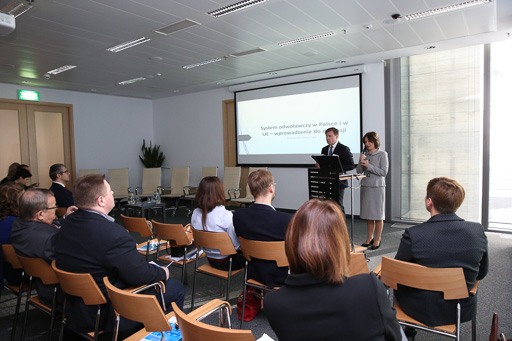
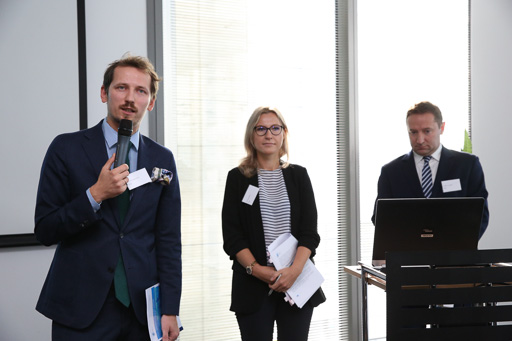
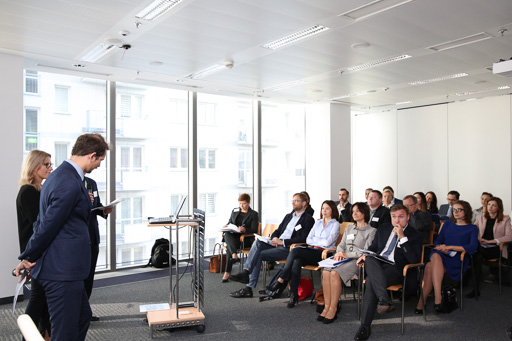
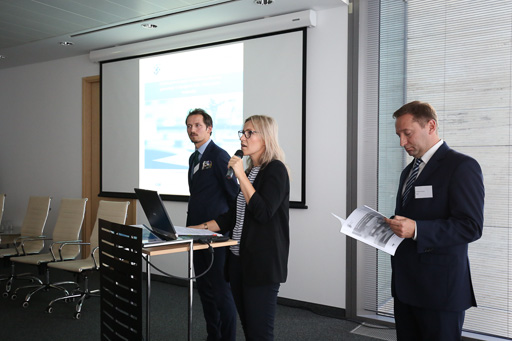
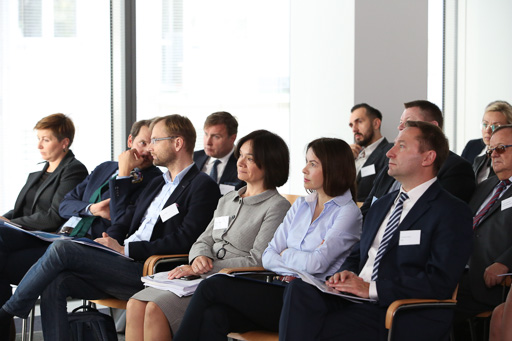
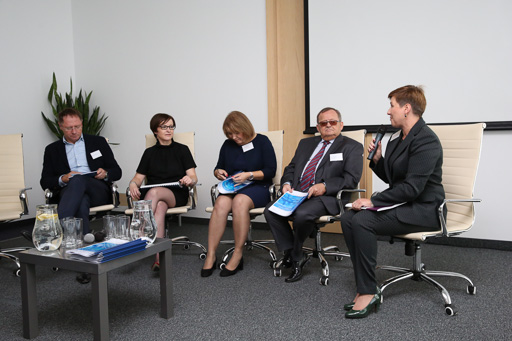
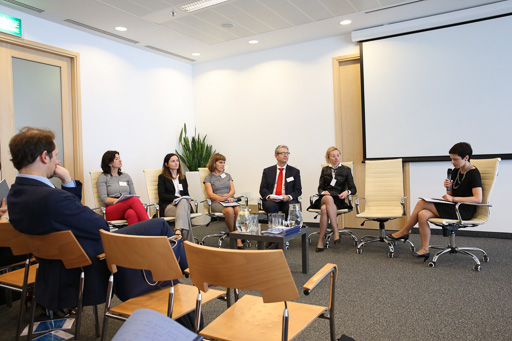
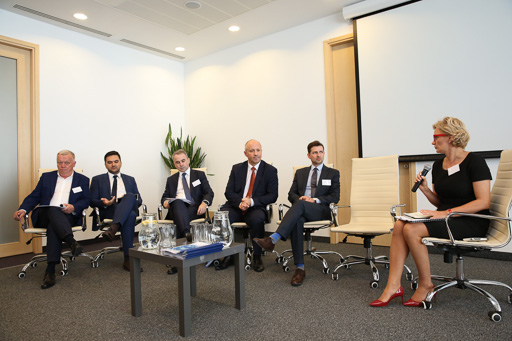
The introduction of mandatory adjudicating panels consisting of three members, appointment of permanent technical and economic experts as well as other assistant officers, are suggestions recommended in a feature article published in the newspaper Rzeczpospolita by Anna Szymańska, Dr. Wojciech Hartung and Dr. Piotr Bogdanowicz, members of the Public Procurement Law Association and authors of the report entitled “The functioning of legal protection measures in EU countries. Key conclusions”. Other proposals include extension of deadlines for filing an appeal, lower registration fees and fees for protection measures, as well as the introduction of an obligation to serve briefs on the parties and other participants of review procedures before a hearing. The authors of the report also suggested that jurisdiction to process appeals against awards handed down by the National Appeals Chamber should be conferred on a single court.
See full article here.
The report was presented during a debate organized by the Association and may be downloaded from the Association’s website.
We are proud to invite you to acquaint yourselves with our report on legal protection measures in EU countries.
The study includes a proposal to extend the time limits for lodging a complaint, reduce the fee for bringing legal protection measures and introduce an obligation to provide parties and participants with pleadings before the hearing.
The authors of the report (Anna Szymańska, Wojciech Hartung PhD and Piotr Bogdanowicz PhD) also recommend that a single court be set up to hear appeals against decisions of the National Chamber of Appeal.
Tomorrow, 28 September 2017, we will launch a debate on legal remedies available under Polish and other EU member states' public procurement laws. The meeting will be attended by public procurement officials, experts and practitioners and a representative of the European Commission. Our status report on legal remedies in EU countries will serve as a point of departure for the ensuing debate.
The report was prepared in furtherance of the primary objectives of the Association which is to popularize legal standards prevailing in the EU in the scope of public procurement and concession contracts, and to propagate knowledge of public procurement and concession contracts regulations in Poland and abroad, and to conduct research, enquiries to prepare and analyses on these issues.
In the opinion of the report’s authors, an effective system of legal remedies in public procurement cases ought to complement public procurement and concession contracts award regulations. In the absence of a robust system, genuine opening of domestic markets to competition on the EU market could prove impossible.
The report’s authors hope that the report will serve to support the analytical process currently conducted at the Polish and EU level, especially in the context of the Polish appellate system.
The report was prepared on the basis of answers to questions asked in a survey sent by Association members to law firms from 27 EU member states. The questions asked involved a wide range of issues, including the system of appeal procedures in the given member state, specific legal solutions and the practical application of available legal remedies.
In an interview in the Rzeczpospolita daily, Aldona Kowalczyk, Chairman of the Public Procurement Law Association, touched on the groundbreaking decision of the National Board of Appeals (KIO) allowing winning bids in below-threshold procurements to be appealed.
“Until now, I was finding KIO’s approach to appeals concerning below-threshold procurements to be utterly incomprehensible. KIO was rejecting all appeals against selections of the best bids en masse whenever these involved charges of neglect in rejecting bids or prospective contractors. This practice was prompted by a restrictive interpretation of the new regulation which, ironically, was promulgated in response to calls from contractors clamoring ― and quite rightly too ― for more leeway in filing appeals in below-threshold procurement procedures. I am pleased with this most recent ruling by the KIO which has now abandoned the restrictive interpretation and came up with one more favorable to contractors,” said Ms. Aldona Kowalczyk.
The entire interview (in Polish) is available at this webpage.
Jolanta Ojczyk hosted Katarzyna Kuźma, Vice-Chairman of the Public Procurement Law Association, on her TV show #RZECZoPRAWIE.
Katarzyna Kuźma outlined the Association’s objectives and discussed the most important public procurement law amendments of recent months.
“The Public Procurement Law and the Act on Concessions are currently being amended and there is also talk of reforming the appeal system. So many issues are involved here that we decided to create our Association to serve as a platform for wide-ranging debates and to act as a partner in substantive discussions on public procurement regulations”, said Ms. Katarzyna Kuźma.
The entire interview (in Polish) is available at this webpage.